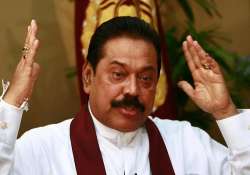Sri Lanka frees Indian fishermen after UN vote
Colombo: President Mahinda Rajapaksa ordered the release of all Indian fishermen in Sri Lankan custody, hours after India abstained from backing a resolution against Colombo at the UN.Just over 100 Indian fishermen remain in Sri

Colombo: President Mahinda Rajapaksa ordered the release of all Indian fishermen in Sri Lankan custody, hours after India abstained from backing a resolution against Colombo at the UN.
Just over 100 Indian fishermen remain in Sri Lankan custody after some 170 others were freed last week, reports Xinhua.
The President's Office said Friday that Rajapaksa ordered all remaining Indian fishermen to be set free as a goodwill gesture.
The Indian government Thursday made a surprise decision to abstain from voting at the UN Human Rights Council in Geneva and criticized the US sponsored draft resolution saying it was inconsistent and impractical.
There was strong speculation that India would back the resolution, especially with political parties in Tamil Nadu raising the pitch against the Sri Lankan government.
But India's permanent representative to the UN in Geneva, Dilip Sinha, said it was New Delhi's firm belief that adopting an intrusive approach that undermined national sovereignty and institutions was counter-productive.
The resolution was, however, passed by a majority vote with 23 countries in the 47-member council voting for it and 12 against. A total of 12 countries abstained.
China, Russia, Pakistan and Cuba were among the countries that voted against the resolution. Japan also abstained.
The resolution calls for an international investigation over alleged human rights abuses during the war in Sri Lanka. Colombo says it will not agree to an international probe.
Just over 100 Indian fishermen remain in Sri Lankan custody after some 170 others were freed last week, reports Xinhua.
The President's Office said Friday that Rajapaksa ordered all remaining Indian fishermen to be set free as a goodwill gesture.
The Indian government Thursday made a surprise decision to abstain from voting at the UN Human Rights Council in Geneva and criticized the US sponsored draft resolution saying it was inconsistent and impractical.
There was strong speculation that India would back the resolution, especially with political parties in Tamil Nadu raising the pitch against the Sri Lankan government.
But India's permanent representative to the UN in Geneva, Dilip Sinha, said it was New Delhi's firm belief that adopting an intrusive approach that undermined national sovereignty and institutions was counter-productive.
The resolution was, however, passed by a majority vote with 23 countries in the 47-member council voting for it and 12 against. A total of 12 countries abstained.
China, Russia, Pakistan and Cuba were among the countries that voted against the resolution. Japan also abstained.
The resolution calls for an international investigation over alleged human rights abuses during the war in Sri Lanka. Colombo says it will not agree to an international probe.